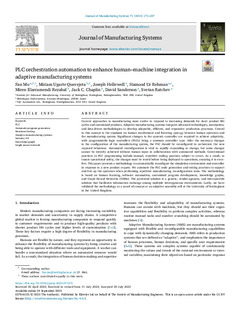Izenburua
PLC orchestration automation to enhance human-machine integration in adaptive manufacturing systemsEgilea (beste erakunde batekoa)
Beste instituzio
TQC Automation Ltd.University of Nottingham
Bertsioa
Bertsio argitaratua
Eskubideak
© 2023 The AuthorsSarbidea
Sarbide irekiaArgitaratzailearen bertsioa
https://doi.org/10.1016/j.jmsy.2023.07.015Non argitaratua
Journal of Manufacturing Systems Vol. 71. Pp. 172-187Argitaratzailea
ElsevierGako-hitzak
PLC
Automatic program generation
Structural testing
Adaptive manufacturing systems ... [+]
Automatic program generation
Structural testing
Adaptive manufacturing systems ... [+]
PLC
Automatic program generation
Structural testing
Adaptive manufacturing systems
Industry 4.0
Knowledge graph
Graph neural network
ODS 9 Industria, innovación e infraestructura [-]
Automatic program generation
Structural testing
Adaptive manufacturing systems
Industry 4.0
Knowledge graph
Graph neural network
ODS 9 Industria, innovación e infraestructura [-]
Laburpena
Current approaches to manufacturing must evolve to respond to increasing demands for short product life cycles and customised products. Adaptive manufacturing systems integrate advanced technologies, ... [+]
Current approaches to manufacturing must evolve to respond to increasing demands for short product life cycles and customised products. Adaptive manufacturing systems integrate advanced technologies, automation, and data-driven methodologies to develop adaptable, efficient, and responsive production processes. Central to this concept is the emphasis on human involvement and fostering synergy between human operators and the manufacturing system. Significant changes to the system’s controller are required to achieve adaptivity, with programmable logic controllers (PLCs) being a common controller type. After the necessary changes to the configuration of the manufacturing system, the PLC should be reconfigured to orchestrate the new required behaviour. Automated reconfiguration is vital to rapidly responding to change, but some changes cannot be entirely achieved without human input in collaboration with automated methods. Conventional practices in PLC programming include manual, repetitive coding practices subject to errors. As a result, to ensure operational safety, the changes must be tested before being deployed to operations, ensuring it is error-free. This paper presents a methodology to automatically reconfigure the simulation environment and controller in response to a new product request. We automate the PLC code generation and testing practices to support and free up the operators when performing repetitive manufacturing reconfiguration tasks. The methodology is based on human learning, software automation, customised program development, knowledge graphs, and Graph Neural Networks (GNNs). The presented solution is a generic, vendor-agnostic, and interoperable solution that facilitates information exchange among multiple heterogeneous environments. Lastly, we have validated the methodology as a proof of concept at an adaptive assembly cell at the University of Nottingham in the United Kingdom. [-]
Finantzatzailea
Comisión EuropeaUK Engineering and Physical Science Research Council
Programa
H2020Sin información
Zenbakia
814078EP/T024429/1
Laguntzaren URIa
https://doi.org/10.3030/814078Sin información
Proiektua
Digital Manufacturing and Design Training Network. DiManDElastic Manufacturing Systems project
Bildumak
Item honek honako baimen-fitxategi hauek dauzka asoziatuta:























